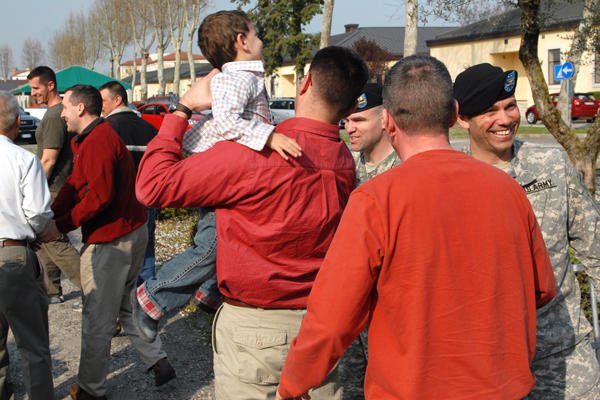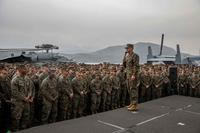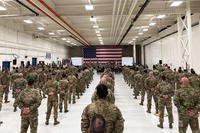One of the service member's most important relationships is with his parents. At this critical time in your service member's life, you cannot overestimate the importance of your approval and support. You helped make your service member the person he is today. More than anything else, he is going to want to know that you love him and are proud of him. This will be a recurring theme for your relationship.
"I will never forget what Patrick did. He didn't tell anyone he enlisted in the National Guard. 9/11 happened, he felt like he needed to do something, so he just went and enlisted. Then one night he took me for a drive and he told me. Well, what could I say? It was done. I felt nothing but fear. But I told him that if this is what he wanted to do, then I supported his decision and I loved him. His relief was obvious, but inside my heart was breaking. It really was."
—National Guard mother
Your service member's need for your approval and support begins when he informs you of his deployment and will continue through the reintegration period—particularly if he struggles with things he may have experienced in combat.
This kind of unconditional support and your service member's need for it may not be obvious, especially if he is older or married. But it will be there. Inside every adult is the child who wants to know that his parents still love him, no matter what happens.
Meanwhile, you may be facing a fear that is unique to a parent: losing one's child. Arguably, there is no greater fear, and no greater loss. It will take courage on your part to silence those fears and instead trust your service member's choice.
If you're the primary support person, your child may talk to you about the details of his chain of command, his mission, and what needs to be done while he's gone. If you're not his primary support person, he may share less, but probably not because he is intentionally trying to exclude you. In this case, you may want to simply ask your service member what he will need from you while he's gone. You can also ask to be put on the contact list for his command's family support group, though those groups are more oriented toward spouses and children. If you feel disconnected because of the lack of support for military parents, check out online resources like www.bluestarfam.org and www. whileourchildrenserve.com for resources aimed at mothers and fathers of service members.
"I had been in Nam and was never much of a talker. And I never talked about the war. Then Jason goes and joins the Army. I didn't even know what to say. I think he wanted me to say something, and the wife kept telling me to tell him I was proud of him, but I felt he had no idea what he was getting himself into. The day he was leaving for Iraq, we drove him to the Armory. Prior to that day, we had never talked about his deployment. As he was hugging his mother, I just broke down. He let go of Margaret and turned to shake my hand, and I just grabbed him and held on to him as hard as I could. And I started crying. My boy was going to war. I was proud. And scared. And mad. But more than anything, I loved him. And I was scared to death he was going to leave and not know it. It was the best and worst hug I have ever had. I didn'teven get to tell him I loved him, I was crying so hard. He just kept saying, ‘I know, Dad, I know.' Every time he called home, I got on that phone and told him I loved him. Every time."
—Veteran and father
Communication: Extended Family and Friends
This is an important time to touch base with the service member you're supporting as well as her close friends, spouse, and family. Your relationship may temporarily change due to the constraints of communication during deployment. If possible, talk to your service member's family about the best way for you to stay in touch while she's deployed. If you're in a position to offer help to those closest to your service member, ask your service member how you can best provide support. Depending on the closeness of your relationship, attempting to support the service member's family could include going over for dinner (often the hardest part of the day for families with deployed service members), offering to watch the children for the at-home spouse, attending their sports or school events, or planning other activities to do together.
|
Communication Tips for Families and Friends Operational Security Expect a certain degree of secrecy from your service member, both prior to and during the deployment. Operational Security (OPSEC) is vital to a safe and successful mission. For more guidance on OPSEC from the Department of Defense, visit www.defense.gov. Communication Blackouts Occasionally, something may happen while your service member is deployed, resulting in her command cutting off all outside communication. If this happens, your service member will be unable to call, text, or email. Don't assume that anything negative has happened just because you're out of communication. Online Networking and Personal Security Social media has changed how servicemen and servicewomen stay in touch with their families and friends. Until recently, military families were only able to stay in touch through letters and long distance landline telephones. Today, many online platforms enable military families to share, connect, and be part of events in real time—from daily updates about "what's for dinner" to milestones like birthdays and graduations. However, there is still a need to maintain personal security (PERSEC) while sharing information online. For a guide for military families using Facebook, visit www.bluestarfam.org. |
This excerpt is provided courtesy of the acclaimed free digital resource "Everyone Serves". Download your free copy with additional media content today at everyoneservesbook.com.

















